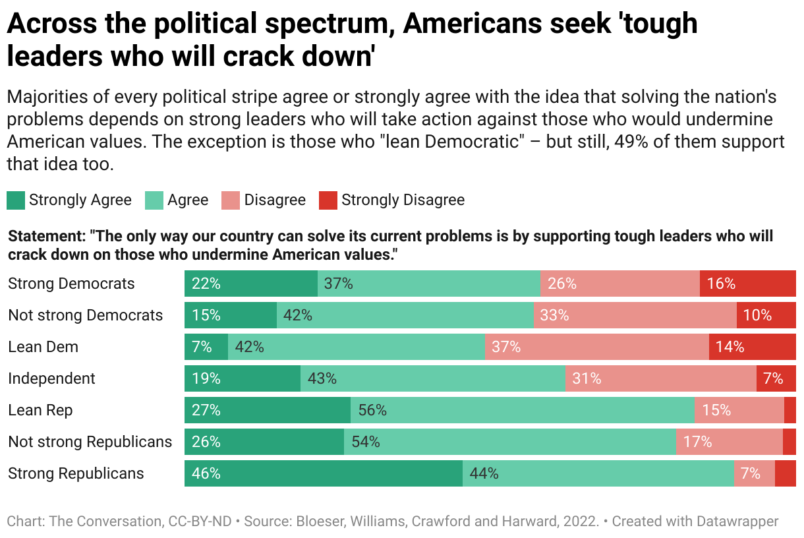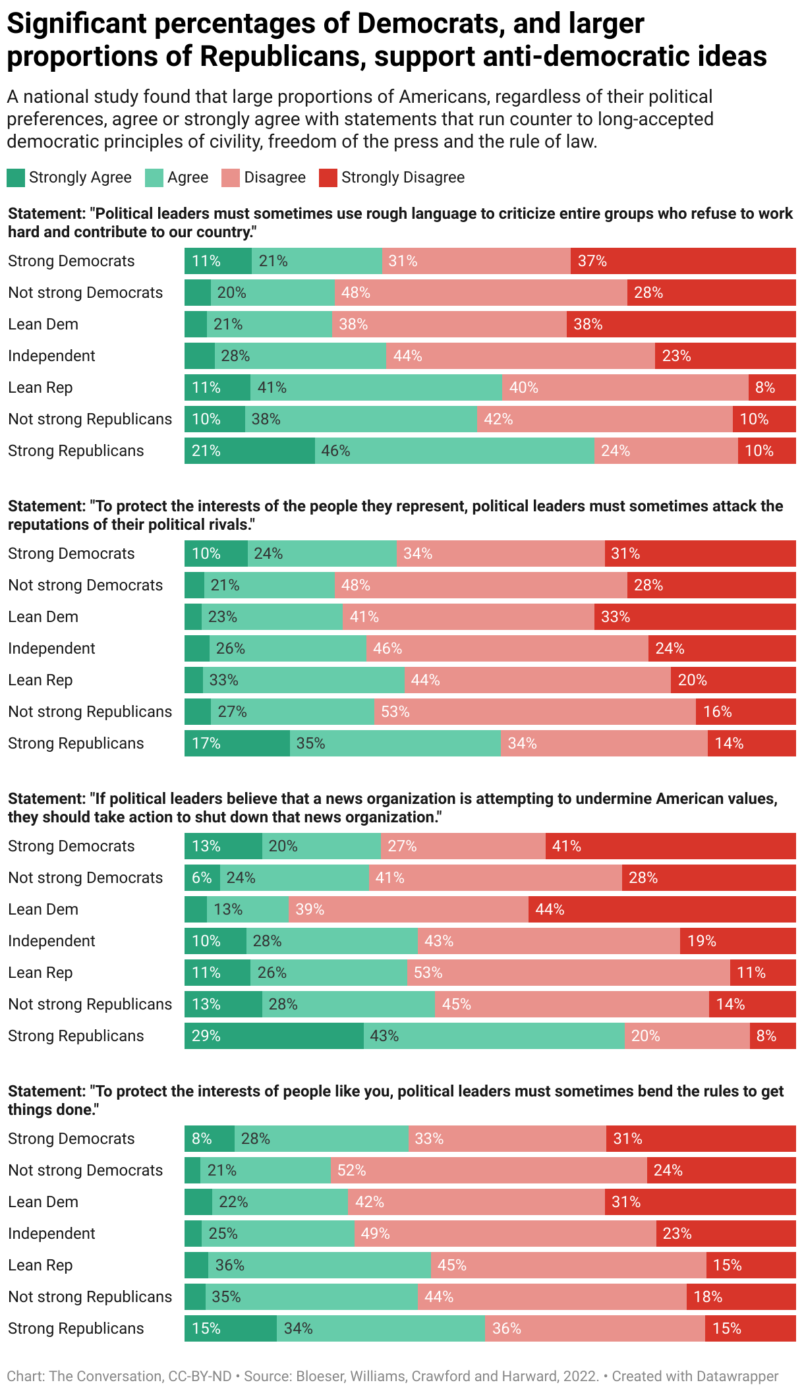This article is part of TPM Cafe, TPM’s home for opinion and news analysis. It was first published at The Conversation.
It might be comforting to think that American democracy has made it past the Jan. 6, 2021, insurrection. But our research shows that a wide range of the American people, of all political stripes, seek leaders who are fundamentally anti-democratic.
It’s true that many who participated in the insurrection are facing consequences, including prison time. Many candidates for state office who falsely claimed that Donald Trump won the 2020 presidential election lost their races. And the congressional committee investigating the insurrection voted to refer Trump to the Department of Justice for criminal charges.
But more than 100 members of Congress who objected to the results of a free and fair election won their reelection campaigns. And at least seven people who attended the “Stop the Steal” rally on Jan. 6 have been elected to state legislatures and two have been elected to Congress.
As scholars interested in how committed citizens are to democracy, we wanted to measure whether regular Americans want someone who will abide by democratic traditions and practices or dispense with them.
Using a nationally representative sample of 1,500 respondents, we found that a large proportion of Americans are willing to support leaders who would violate democratic principles.

Support for anti-democratic leaders
About two decades ago, an important study found that roughly 1 in 4 Americans supported leaders who are uncompromising and take decisive action. These people said they would also prefer nonelected experts to make decisions. Our study replicates this finding nearly 20 years later but sheds light on a troubling reason for this preference.
At the Allegheny College Center for Political Participation, we, with our former student Candaisy Crawford, asked people about their willingness to support leaders who promised to protect them by any means necessary, even if that meant violating expected standards of behavior in a democracy, a set of principles often called “democratic norms.” We developed these questions based on existing research about the strategies that leaders with anti-democratic tendencies use to build public support.
In Venezuela, for instance, democratic decline happened gradually. Early on, Venezuela’s former president Hugo Chavez was known for using nationalist language and calling opponents epithets like “rancid oligarchs” and “squealing pigs.” Later, he blacklisted those who sought his removal from office through a democratically conducted referendum. Eventually, he went further, arresting and exiling his political opponents.
These types of tactics have also been used in other nations, such as Turkey and Hungary, by leaders who rose to power through democratic elections.
In our study, we asked about behaviors that foreshadow the early stages of democratic decline. For example, we asked citizens whether they thought that “the only way our country can solve its current problems is by supporting tough leaders who will crack down on those who undermine American values.” We also asked about explicit violations of democratic principles, like shutting down news organizations and “bending the rules to get things done.”
By design, some of these questions allow citizens to use their own interpretations of actions like “crackdowns” and “bending the rules.” These types of practices can take a number of different specific forms, as the cases of Venezuela, Turkey and Hungary illustrate. Our aim was to determine whether citizens were inclined toward leaders who seek power by promising retribution toward some groups and benefits for others, because this rhetorical strategy is often a precursor to explicit violations of democratic institutions.
Likewise, the phrasing of our questions is designed to allow respondents to rely on their own ideas about the meaning of “American values,” and “people like you.” Our interest was in what people would enable leaders to do to protect their idea of America and the Americans with whom they identify.
We found that people who want this type of protective but anti-democratic style of leadership were by far the most inclined to want leaders who would take uncompromising, decisive action. These people did not merely want their side to win a political competition for power. They were literally willing to say they would “bend the rules” to do it, a clear violation of the democratic ideal that everyone must follow the same rules.
For each item, we found that at least a third of the people we polled agreed or strongly agreed with these subtle or explicit violations of democratic norms.

Across the political spectrum
Anti-democratic statements are embraced by members of both U.S. parties, but more commonly by Republicans.
For example, around 90% of Republicans would support tough leaders who crack down on groups that “undermine American values” – however the survey respondents define those values. More than half of Democrats take the same position. Perhaps even more notably, nearly half of citizens who strongly support the Republican Party and over a third of those who strongly support the Democratic Party endorse the view that it is acceptable to “bend the rules” for people like themselves to achieve political goals.
This echoes other research that has found Americans, on both sides of the political aisle, are willing to sacrifice democratic principles and practices if it means their political party wins elections.
An appetite for protection
The key to understanding these views, we believe, is a desire for protection.
Many Americans view those in the other party as existential threats to the country — and closed-minded, dishonest, immoral and unintelligent too. All this coexists with growing evidence that more people are willing to support political violence under certain circumstances.
Many citizens prefer leaders who are willing to undermine democracy if it means protecting people like themselves from groups that threaten their values or status. Although most Americans do not subscribe to these beliefs, a substantial portion of the country does.
Leaders who actively promise anti-democratic action may come and go, but we fear the appetite of many Americans for such actions may always be a persistent threat.
This article is republished from The Conversation under a Creative Commons license. Read the original article.







Be careful what you wish for.
But… one that supports their views, bit of a important detail there.
Did I mention…
Church, cults, politics, some people just want the freedom to be told what to do.
I nominate Karen the high school sophomore:
Surreal and stunning that this is a member of congress that actual adult humans voted for.